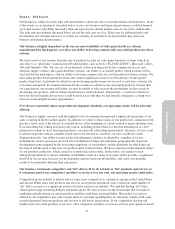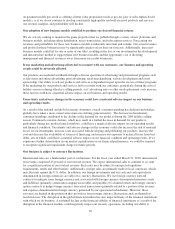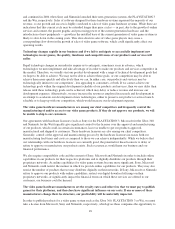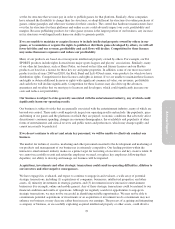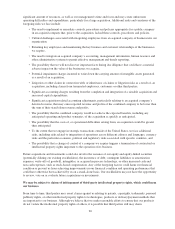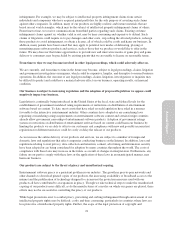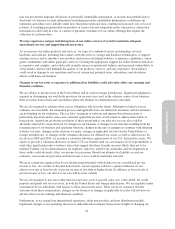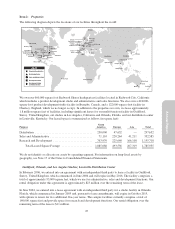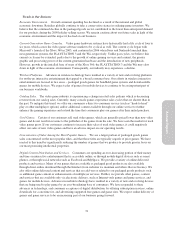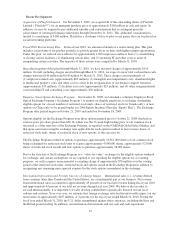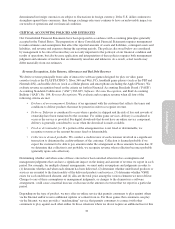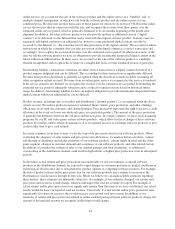Electronic Arts 2010 Annual Report Download - page 102
Download and view the complete annual report
Please find page 102 of the 2010 Electronic Arts annual report below. You can navigate through the pages in the report by either clicking on the pages listed below, or by using the keyword search tool below to find specific information within the annual report.laws, expiring rulings, acquisitions and our current and anticipated business and operational requirements, our
tax expense could increase.
Our reported financial results could be adversely affected by changes in financial accounting standards or
by the application of existing or future accounting standards to our business as it evolves.
Our reported financial results are impacted by the accounting policies promulgated by the Securities and
Exchange Commission (“SEC”) and national accounting standards bodies and the methods, estimates, and
judgments that we use in applying our accounting policies. Policies affecting software revenue recognition have
and could further significantly affect the way we account for revenue related to our products and services. We
recognize all of the revenue from bundled sales (i.e., packaged goods video games that include an online service
component) on a deferred basis over an estimated online service period, which we generally estimate to be six
months beginning in the month after shipment. As we increase our downloadable content and add new features to
our online service, our estimate of the online service period may change and we could be required to recognize
revenue over a longer period of time. We expect that a significant portion of our games will be online-enabled in
the future and we could be required to recognize the related revenue over an extended period of time rather than
at the time of sale. In addition, our adoption of Financial Accounting Standards Board (“FASB”) Accounting
Standards Codification (“ASC”) 805, Business Combinations, has had a material impact on our Consolidated
Financial Statements for material acquisitions consummated after March 28, 2009. As we enhance, expand and
diversify our business and product offerings, the application of existing or future financial accounting standards,
particularly those relating to the way we account for revenue and taxes, could have a significant adverse effect on
our reported results although not necessarily on our cash flows.
We rely on business partners in many areas of our business and our business may be harmed if they are
unable to honor their obligations to us.
We rely on various business partners, including third-party service providers, vendors, licensing partners,
development partners, and licensees, among others, in many areas of our business. In many cases, these third
parties are given access to sensitive and proprietary information in order to provide services and support to our
teams. These third parties may misappropriate our information and engage in unauthorized use of it. The failure
of these third parties to provide adequate services and technologies, or the failure of the third parties to
adequately maintain or update their services and technologies, could result in a disruption to our business
operations. Further, the disruption in the financial markets and the global economic downturn may adversely
affect our business partners and they may not be able to continue honoring their obligations to us. Some of our
business partners are highly-leveraged or small businesses that may be particularly vulnerable in the current
economic environment. Alternative arrangements and services may not be available to us on commercially
reasonable terms or we may experience business interruptions upon a transition to an alternative partner or
vendor. If we lose one or more significant business partners, our business could be harmed.
Our stock price has been volatile and may continue to fluctuate significantly.
The market price of our common stock historically has been, and we expect will continue to be, subject to
significant fluctuations. These fluctuations may be due to factors specific to us (including those discussed in the
risk factors above, as well as others not currently known to us or that we currently do not believe are material), to
changes in securities analysts’ earnings estimates or ratings, to our results or future financial guidance falling
below our expectations and analysts’ and investors’ expectations, to factors affecting the entertainment,
computer, software, Internet, media or electronics industries, to our ability to successfully integrate any
acquisitions we may make, or to national or international economic conditions. In particular, economic
downturns may contribute to the public stock markets experiencing extreme price and trading volume volatility.
These broad market fluctuations have and could continue to adversely affect the market price of our common
stock.
Item 1B: Unresolved Staff Comments
None.
24



